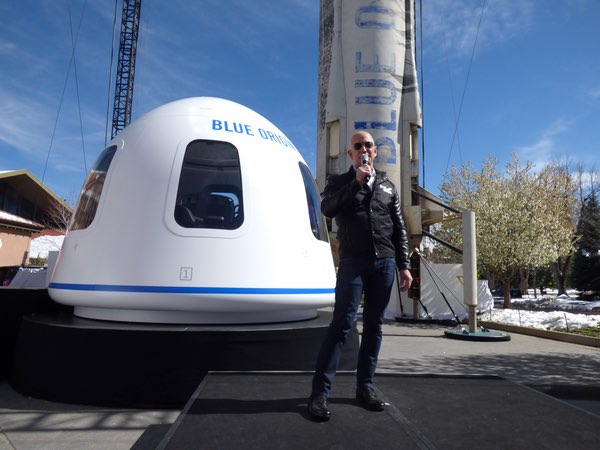Giant ferocious steps from Jeff Bezosby Sam Dinkin
|
| Is Jeff Bezos finally shifting his attention to his passion from Amazon to Blue Origin? If so, good for him. |
New Shepard has had 15 successful test flights, and is, without a doubt, thoroughly engineered to be as safe as modern engineering can make it on a generous budget. Certainly, the New Shepard is likely to be far safer than the Mercury Redstone rocket that Alan Shepard rode into space 186 kilometers above the Earth 60 years ago on May 5, 1961. That rocket had one unsuccessful and two successful test flights prior to Shepard’s inaugural human flight. But there is a genuine risk of failure for New Shepard that cannot be shown empirically to be less than 2 in 135 of the Space Shuttle or the 2 in 141 crewed Soyuz missions that resulted in loss of life without actually having many flights in a row with no loss of life. If the odds of failure are 2 in 141, then there is still an 80% chance that 15 successful test flights in a row would succeed. With the auction for another seat on the same flight reaching $28 million dollars, Jeff Bezos is not the only one willing to risk everything to personally become a space pioneer.
Step 2: paying for going to space
Last week, the Senate passed a version of the Endless Frontiers Act that includes an authorization of $10 billion for funding a second company to join SpaceX as to develop landers for carrying astronauts to the surface of the Moon. Like the advice I gave in my 2004 paper with John Jurist and David Livingston (p. 24), it is a lot cheaper to lobby the US government to pay for something than to pay for it yourself. The sum of the 2018 and 2020 election cycle campaign spending is almost $20 billion. The last two Congresses, 2017–2018 and 2019–2020, passed a total of 787 enacted laws. That suggests getting an unopposed law through Congress probably costs less than $20 billion/787 or about $25 million. An amendment might be cheaper, but having SpaceX oppose might make it more expensive. We will see how that shakes out after the bill goes into conference committee, but even a 50-50 chance of steering $10 billion to pay for a competition Blue Origin has a very good chance of winning second place in is likely worth a lot more than $25 million. Is Jeff Bezos finally shifting his attention to his passion from Amazon to Blue Origin? If so, good for him.
Step 3: making the growth of human population in space sustainable
Blue Origin may succeed in winning a law and a development contract, but like I quipped about Lockheed Martin in 2004, “Where’s the angle to make a profitable permanent operation without subsidy?” (see “Implementing the vision”, The Space Review, October 25, 2004). Blue Origin, by getting $1 billion per year from Jeff Bezos, and maybe more from NASA, is training itself to satisfy NASA and its funder, not directly seeking a viable opening of space at a price point that will ensure the “trillions” of people in space he foresees in the future. SpaceX has needed its commercial operations to support its vision of spaceflight to Mars. Unless Blue Origin can change its DNA to act more like a disruptive cost cutter like Amazon instead of a traditional aerospace firm, its main role may be to reduce prices for competitively bid government spaceflight. If SpaceX continues to have a much higher profit margin on each flight, it will continue to come up with its own spinoffs, like Starlink, where the SpaceX contribution is made at wholesale cost without cannibalizing its own commercial launch prices. And the private Moon flights and point-to-point suborbital flights, that D.D. Harriman created in fiction, are more likely to be SpaceX flights than Blue Origin ones.
Note: we are using a new commenting system, which may require you to create a new account.
